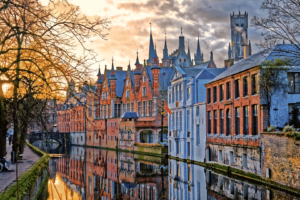Introduction
These days, many people dream of retiring somewhere sunny, warm, drenched in culture, and filled with great food, music and history. Some choose an island, others look to central and South America, but many are turning their sights towards Europe.
If you dream of a place in the sun in Europe, there’s no better option than retiring in Portugal. It’s the perfect combination of beautiful, interesting, historic, fun, safe, and affordable. In fact, it is fast becoming one of the premier retirement destinations in Europe. Here’s what you need to know.
Who Can Retire in Portugal?
The first thing you need to know about retiring in Portugal, is that you will need to meet minimum immigration standards. This usually means you will need to have a criminal, security, and medical check done before you were approved. But the process is actually surprisingly simple, and the Portuguese government has gone out of their way to attract expat retirees. That’s good news for everyone who hopes to retire in this beautiful country.
EU- Citizens
If you are citizen of the European Union, you have the easiest process when retiring in Portugal. all you need to do is applied to the SEF (Servico de Estrangeiros e Fronteiras) which is the Portuguese immigration authority. The process is quick and easy and there are several offices throughout the country. Once the application is complete you will get a residency permit and permission to stay in Portugal.
Non-EU Citizens
If you are not an EU citizen, the process is a little more complicated. This is because unlike European Union members, your country probably doesn’t share information about you with the Portuguese government. So, you will have much closer to a traditional immigration process, which will include proving your income criminal record checks, medicals another red tape.
Provided you successfully complete the immigration process, you will be given a five-year residency permit, which will allow you to stay temporarily in Portugal. You will need to renew that permit every five years, but you may also have the opportunity to apply for permanent residence.
You also have the option, to apply for immigration by investment, which means investing in government approved businesses or purchasing property to a minimum value in Portugal. This can put you on the path to eventual Portuguese citizenship, as long as you continue to meet citizenship requirements.
Are American Retirees Welcome in Portugal?
Portugal is very welcoming to citizens of most countries, and that includes American retirees. In fact, they’ve made it easy for Americans to settle in Portugal by means of 120-day temporary residency permit. You will need to prove that you meet the minimum income requirements, but provided you do and assuming you want to stay you can renew this permit for a year and then subsequently for two years.
Eventually if you want to stay in Portugal permanently, you can upgrade to permanent residency, which also gives you a path to Portuguese citizenship.
How to Retire in Portugal
As with most countries, navigating the Portuguese immigration system can be a headache in terms of red tape. But the process is neither difficult nor complicated. In fact, provided you meet the minimum criteria for the immigration process you choose, it’s simply a matter of filling in forms and paying the application fees. The worst part of the process is waiting.
Retirees have two main ways of settling in Portugal.
Two Alternatives: D7 Visa and the Golden Visa
The first way that you might consider retiring in Portugal, is what is known as the D7 visa, or the passive income visa. This is for retirees who are earning an income from a pension plan or retirement plan or from residuals from investments, who don’t work but who earn a regular reliable income that meets minimum requirements.
You might think of this as the classic idea of retiring. You’re not planning to work or do business in Portugal, and you just want to enjoy the country with the money you’ve already saved.
The other option for people who are considering retiring in Portugal, is the so-called golden visa. This is also known as immigration by investment, and it’s based on making an investment to a minimum value in a government approved business, starting a business that creates 10 or more jobs, buying property or related business activities. Generally, you will need to have several thousand dollars of available capital, that you can invest for several years. You will need to maintain the investment for the full period of your temporary residency but may be able to recoup your investment when you apply for permanent residents.
This option might be a good idea, if you don’t think putting your feet up in the sun is the best way to spend the next five years, and you have the capital available to invest.
Retirement Laws and Retirement Tax in Portugal
If you plan to retire in Portugal, you will need to make sure that you abide by local laws, that includes tax laws. The good news is, even if you stay in Portugal for more than half a year and are classed as a tax resident, there may be benefits to being subject to Portuguese tax laws.
You will also need to maintain foreign health insurance, while you are a resident in Portugal. If you have not contributed to local Social Security taxes, and you are not working in the country, you will not be able to use the local public health services.
Tax Advantages
If you are a tax resident in Portugal (which means you spend more than half of the year in Portugal) you will be subject to tax on your international earnings. This does typically include foreign pensions. however, Portugal does have double taxation agreements 52 countries. So, you might not have to pay tax in both your home country and in Portugal.
Does Portugal Tax US Social Security?
Even though you will pay tax on any US pensions you receive while living in Portugal, the USA has an agreement with Portugal that American Social Security payments are not taxable. So, this will reduce your tax.
How to Transfer Pensions to Portugal
Portuguese citizens contribute to a national pension plan, that they can access at the age of 66 years and three months. However, if you are retiring in Portugal, you will not have contributed to this fund and therefore will not be eligible for pension payments.
If you are retiring to Portugal from another EU country, it is possible to transfer your local national pension to Portugal. The rates and procedure may differ so contact the authorities in your country to check what the procedure is.
If you are retiring to Portugal from a non-EU country, you will need to check with your home country authorities or any private pension schemes that you belong to, to find out how you can draw your pension from Portugal. This is usually a relatively simple procedure however and may be as simple as providing your pension plan administrators with your local banking information.
Healthcare in Portugal
Like most of Europe Portugal has a public healthcare service that is funded by income tax. However, if you are not paying income tax and not working in Portugal, you will not be covered by the local health care system. This means you will need to get foreign health insurance before you move to Portugal. However, once you arrive and are a resident in the country you might be able to get local health insurance, which is likely to be cheaper than you would pay from elsewhere.
Generally, the healthcare system in Portugal is good, however in busy large cities it can take time to get appointments and treatments. If health care is a concern, you might want to look at smaller cities rather than settling in the capital of Lisbon for instance.
Cost of Living in Portugal
The cost of living in Portugal varies greatly. If you choose to live in the capital city of Lisbon, for instance, you can expect to pay significantly more than you would in a smaller city or town. This is similar to any other country where some cities are more expensive than others.
Generally, the cost of living in Portugal is lower than other EU countries, and maybe lower than other developed countries. It depends where you are moving from. These costs are provided as a guide only, and you should refer to costs for the city town you plan to move to.
Rent
Rent in Portugal can vary greatly depending on where you live. Living in a big city will cost you more than living in a smaller town and living in the centre of any city will cost you more than living further out.
A single bedroom apartment in the centre of Lisbon, will cost you a little over $1000 a month. A similar sized apartment in the centre of a smaller city like Porto, would cost you less than $800 a month. If you opt to live outside of the city centre, the same apartment in Lisbon would cost a little under $800, and in Porto it would probably be less than $600. So, if you don’t need a lot of room, rent is very affordable compared to many other big cities.
Food
Portugal is a major food producer, which means you have the advantage that many of the products you buy will be locally sourced and not imported. This means that the cost of food in Portugal is generally lower. A single person living in Portugal can expect to spend 100 to $200 a week on food, depending on how often you eat out etc.
Transportation
Transportation costs vary greatly in Portugal. Here’s where biggest cities tend to be more favorable, because they have better developed public transit systems and you won’t have to rely on taxis and similar as much. That having been said most Portuguese cities are very walkable and if you choose your accommodation carefully you might have most of what you need within walking distance. The weather is also favorable in most cities, so walking is never a problem.
If you do choose to make public transit part of your transportation plan, you can expect to pay about 40 euros a month for a transit pass. Gas costs a little more than $1.50 a liter, and if you choose to buy a car you can get a reasonable small call for around $25,000.
Other Expenses
Because Portugal is a warm country, you won’t be spending much on heating – although you might want to invest in an air conditioner for hot summer days. In general utilities Internet and cell phone bulls will cost approximately $150 to $200 a month depending on your usage.
Best Places to Retire in Portugal
Portugal is a beautiful country, and there are many historic and interesting cities throughout. Whether you choose the hustle and bustle of Lisbon, this quieter pace of Porto or the sun and sand of the Algarve, there are no real bad choices here. Most cities have good infrastructure, lots to see and do, and all safe and secure to live in.
Bottom Line / Conclusion
Portugal is fast becoming one of the most sought-after retirement destinations in Europe. The government encourages foreign retirees to make the country their base of operations, which means there’s less red tape involved in putting down roots.
Portugal is also part of the EU, so if travel culture and history are on your retirement to-do list it’s the perfect base of operations. The weather is fantastic too and of course Portugal is well known for food and wine.
Frequently Asked Questions
What Is a D7 Visa?
The D7 visa, which is also known as the passive income visa, is an immigration option for people who want to move to Portugal and receive a regular reliable and reasonable income. This includes a pension.
If you are successful in applying for a D7 visa you will have permission to live in Portugal but can also work, study, or start a business while you are in Portugal [provided you meet all local requirements and laws.]
What Is a Golden Visa?
A golden visa is the term used to describe immigration by investment. Several countries in Europe and elsewhere offer this option to people who have money to invest. In return for a minimum investment in a government approved business or property, which must be retained for the duration of your stay, you are provided temporary residence in Portugal. At the end of a five year., and provided you continue to meet all requirements, you will be eligible to apply for permanent residence.
Can I Become a Portuguese Citizen?
Yes. People who are permanent residents of Portugal and who meet the citizenship requirements in terms of eligibility and length of residence, can apply to become Portuguese citizens.
Can I Bring My Spouse with Me?
Yes, both the D7 and golden visa programs, offer the option of bringing your spouse and even dependent children with you. You will be required to provide proof of additional income to cover their cost of living, and they must all be eligible in terms of criminality, security, and medical history.
How Long Does the Process Take?
The time it takes to process any immigration application will vary from case to case. It will also depend which program you’re applying under. However, you can expect any immigration application to take several months and longer.
How Do I Know If I Will Like Portugal?
Moving to a new country is always difficult. It’s always recommended that you familiarize yourself with the country you plan to move to before you make any plans. If you have never been to Portugal before, you will want to make a trip to see what it’s like before you commit. Most people love Portugal, but it’s not guaranteed. Under the D7 program, you can also apply for 120-day visa, so you can stay in the country for four months and find out what it’s really like.
How Long Can I Stay?
The duration of your stay in Portugal will be determined by the temporary residence permit you are issued. This could be anything from the 120 days mentioned above, to two years. you will need to apply to renew your residency permit, before it expires, to ensure you retain legal status in Portugal.
How Do I Apply?
The immigration process is not designed to be difficult or to exclude people from moving to Portugal. But there are several hoops you will need to jump through, and the paperwork can be tricky to complete, depending on which program you’re applying under. You will also need to provide various supporting documents when applying. It’s always a good idea to speak to someone who is familiar with the process, firstly to make sure that you qualify, and secondly to ensure you complete the process properly.





Comments: 4
Great article, totally what I needed.
can I bring my cars into Portugal when I retire (USA)
I believe you have remarked some very interesting points, thankyou for the post.
I like this weblog its a master peace ! Glad I discovered this on google .